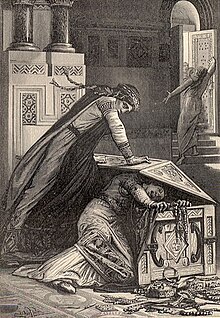Rigunth
- View a machine-translated version of the German article.
- Machine translation, like DeepL or Google Translate, is a useful starting point for translations, but translators must revise errors as necessary and confirm that the translation is accurate, rather than simply copy-pasting machine-translated text into the English Wikipedia.
- Do not translate text that appears unreliable or low-quality. If possible, verify the text with references provided in the foreign-language article.
- You must provide copyright attribution in the edit summary accompanying your translation by providing an interlanguage link to the source of your translation. A model attribution edit summary is
Content in this edit is translated from the existing German Wikipedia article at [[:de:Rigunth]]; see its history for attribution. - You may also add the template
{{Translated|de|Rigunth}}to the talk page. - For more guidance, see Wikipedia:Translation.
| Rigunth | |
|---|---|
 Fredegunde tries to kill Rigunth, 1887 | |
| Born | c. 569 |
| Died | after 589 |
| House | Merovingian dynasty |
| Father | Chilperic I |
| Mother | Fredegund |
Rigunth (c. 569 A.D. – after 589 A.D.), also known as Rigundis, was a Frankish princess, daughter of the Merovingian King Chilperic I and Fredegund.
Biography
Rigunth was the eldest child and only recorded daughter of Chilperic I and Queen Fredegund. About 583, she was betrothed to Recared, eldest son of Leovigild, King of the Visigoths. In September 584 she was sent to Spain in a convoy with a large treasure as dowry. During the journey King Chilperic died and the soldiers escorting the princess took everything they could steal and fled.[1] At Toulouse, Duke Didier seized what was left. The princess was returned to her mother in 585.[2]
She took refuge with her mother and led a life viewed as debauched. She often quarreled with her mother who failed in an attempt to kill her in 589.[3] Her date of death is unknown.
Further reading
- Eugen Ewig: Die Merowinger und das Frankenreich. 4. Auflage, Kohlhammer Verlag, Stuttgart 2001. ISBN 3-17-017044-9
- Martina Hartmann: Aufbruch ins Mittelalter. Die Zeit der Merowinger. Darmstadt 2003, ISBN 3-534-15829-6.
References
External links

- Gregory of Tours, Historiae
- v
- t
- e










